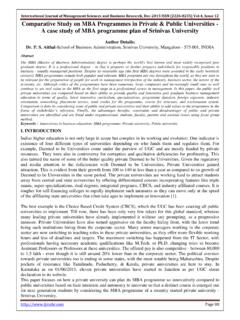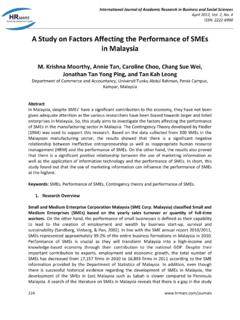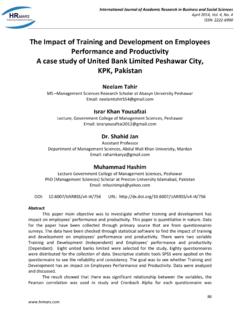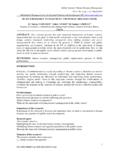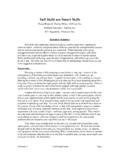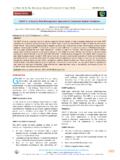Transcription of International Journal of Management Sciences and Business ...
1 International Journal of Management Sciences and Business research , Sep-2015 ISSN (2226-8235) Vol-4, Issue 9 Page 19 Strategic Planning in Saudi SMEs: Case Studies in the Private Health Insurance Sector Author's Details: Hana J. M. Alotaibi -College of Business - Umm Al-Qura University- Makkah- Saudi Arabia Abstract SME's usually make a significant contribution to the host economy, but they tend to face many obstacles and challenges, especially related to finance and marketing. Recently, the Saudi government is giving a renewed attention to promoting SME's, as well as the insurance sector, which faces additional challenges of stiff competition, and the need to satisfy customers' high standards and expectations.
2 This study sought to provide insight into how SME managers in the Saudi health insurance sector deal strategically with the issues they face. Five case studies were made, and the selected firms were analysed based on Mazzarol's strategic Management framework, which involved identifying characteristics pertaining to entrepreneurship, innovation, strategic networking, growth vector, and the strategic triangle. All of the firms are exhibiting growth, the newer ones had relatively more dynamic entrepreneurship and innovation, and there is evidence of more long-term strategic planning in two of the latter.
3 None of the selected firms appear to be struggling in the way that is commonly described for SME's generally, as they were found to be strategically prepared to cope with the challenges. Index Terms Strategic planning, Strategic implementation, SME, health insurance. INTRODUCTION This study examined the private health insurance sector in the Kingdom of Saudi Arabia with a focus on SME's operating in this sector and the way they conduct strategic planning. Some background details are provided on SME's in Saudi Arabia, their definition and challenges, further characteristics of the Saudi insurance sector, and in particular health insurance companies and the market characteristics.
4 A brief literature review is then made of strategic Management in SME's in general. This is followed by details of the aims and methodology of the primary research to provide more insight into strategic Management in the Saudi health insurance sector, details of the framework used for analysis, the findings and the analysis itself. These findings are then discussed in light of the literature review. BACKGROUND SMEs in Saudi Arabia An SME is a small to medium sized enterprise having a small number of employees compared to larger enterprises although it may also be defined in terms of annual turnover and assets.
5 The size threshold varies between countries, but for Saudi Arabia, this is 60 for small and 100 for medium according to the Saudi Arabian General Investment Authority. In terms of capital, it is 5 million Saudi Riyals for small and 20 million for medium. SME's often make a significant contribution to the growth and development of the host economy. In Saudi Arabia, their contribution is around 33% to GDP, and 25% to the labour force [1]. This percentage is usually much higher in other countries, but in Saudi Arabia the main catalysts for economic activity are the oil and public sectors with larger enterprises.
6 However, it is projected to increase to 37%, and the number of licensed SME's to rise to million by the end of 2015 [2]. Currently, SME's account for over 90% of all businesses (King, 2015), and employ over 80% of the workforce, so their role is also important in terms of generating employment. However, findings from a survey by the Council of Saudi Chamber of Commerce and Industry (CSCCI) in Riyadh reveal that besides bureaucracy, major obstacles faced by SME's relate to financing and marketing among others.
7 In addition, common challenges faced by SME's globally are globalisation and International trade integration. Recently, the Saudi government has been making some strides in reducing bureaucracy and improving access to finance for SME's [3]. However, plans to implement a much needed nationally coordinated effort have still not been implemented, and SME's remain challenged by the other issues as well. The Saudi insurance sector With the passing of the Cooperative Insurance Companies Control Law over a decade ago in 2004 (by Royal Decree M/32), the Saudi insurance industry underwent major regulatory reforms.
8 Since then, the industry has transformed to having a high standard of clear, transparent, and customer focused regulatory framework, with clear objectives of developing the Insurance Industry, promoting healthy competition, and protecting the interests of the policyholders [4]. It has also grown rapidly, and there are now a large number of indigenous companies. The insurance market is characterised by cut-throat competition, customers perceive a need to reduce payout delays, and there is potential for expanding in the wider Gulf region [5].
9 Even within the Saudi kingdom, there is still potential for growth, especially for health insurance, which has low penetration [6]. SME's in the insurance sector face further problems of their own. Many firms have been suffering losses, especially due to fraud, and are struggling to survive in a saturated market [5]. Although the situation may have improved in recent years, there is insufficient research on firms operating in this sector. Private health insurance companies The private health insurance sector in Saudi Arabia came into existence following the Health Insurance Act in 1999.
10 It is additionally regulated by the Council of Cooperative Health Insurance (CCHI). The sector is dominated by three main players: Tawuniya, Medgulf and Bupa Arabia. Their combined market share stood at as of 2011 [7]. In total, there are 26 health insurance companies based on those listed on the Tadawul Stock Exchange. Notably, many of these are concentrated in large cities, especially Riyadh and Jeddah. Other well known health insurance providers include Allied Cooperative Insurance International Journal of Management Sciences and Business research , Sep-2015 ISSN (2226-8235) Vol-4, Issue 9 Page 20 Group, United Cooperative Insurance Company, AXA, and AMANA.

